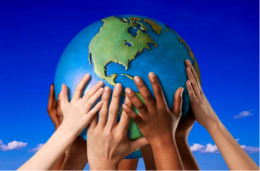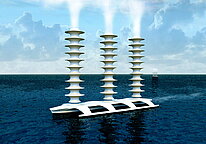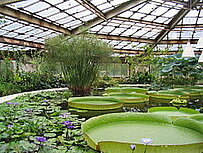Global challenges
Motivation

This page is under constrution/Dies Seite befindet sich gerade im Aufbau...
In collaboration with Prof. Dr. Phuoc Tran-Gia (Vice president for internationalisation, information Technology, alumni and public relations)
Motivation: Change the world - if you are not ready for change, you will be rolled over:)
1. Change for Real: The risky & chaotic Megatrends for mankind:
- Global warming & biodiversity
- Population growth & food security (overpopulation: Africa >4bio. people by 2100)
- Nuclear weapons - Prevention of major war (USA: 1$ Trillion over 30 yrs. for nuclear weapon)
- Dwindeling resources
- Internet and freedom
- Stephen Hawking warns artificial intelligence could end mankind but also itself could do the job: BBC Interview future of mankind:
→ http://news.bbc.co.uk/today/hi/today/newsid_9672000/9672233.stm
→ http://www.bbc.com/news/technology-30290540
2. What can we do?
⇒ Principle efforts:
- Spread the word: letters to the editor, op-eds, internet
- Get politically involved: let elected officials know what’s important
- Take action in an area that excites you, such as closing coal-fired power plants, tax restructuring, or ending biofuel mandates that raise food prices
- Incentive for usage
- Educate yourself on environmental issues
⇒ Act now, act rational, plan & fare well! Well fare plan of UNESCO
But: NOT wild technologie: „Autonomous waapons”, „Nuclear bombs”, „Wild bugs”, „uncontrolled Artificial intelligence”
⇒ Technologies should be:
- Transparent
- each step and implementation planned and always controlled
- not „alive”, „wild”, but convenient, controlled and comfortable
⇒ Principle information:
- Global Challenges - Global Futures Studies: Global Challenges for Humanity - excerpt from 2009 State of the Future. The 15 Global Challenges ...
- Global Challenges Foundation - The Global Challenges Foundation wants to facilitate decisions for efficient actions against the greatest global risks facing humanity, that we are unable to manage ...
⇒ Solutions: Three different plans
| Plan/efforts | Global activities | Würzburg efforts |
|---|---|---|
Plan A Bad project: No change, business as usual ⇒ leads slowly to ultimate disaster, we have to act |
|
|
Plan B Rational: Try to influence bad Mega Trends by direct action (Decisive action for sustainment) ⇒ Evolve, adapt, transform into a sustainable, intelligent, free and creative community (in particular strong regarding sustainability) |
|
|
Plan C Improve living while protecting against desaster ⇒ super resilient technologies are needed to save population, rebuild after disaster, help the failing state, cope with elevated global temperatures or diminish them, smart measures to improve climate: dual use (local benefit) |
⇒ Technology well known - Improve harvest in cold and aride areas (direct benefit for Dual use) ⇒ They protect against UV irradiation and sustained winter (e.g. in Ice Land) ⇒ maybe produced from nanocellulose (environmental freindly) |
→ Prof. Dandekar: light-gated information storage & proteins-programmable bacterial membranes pore proteins: resistors, condensators → An integrated nanocellulose chip for information storage and processing (more information see references bottom) → This technology was finalist in emerging technologies competition Royal Soc. London (2015)
|
ODER
- „Plan A” = Bad project: No change, business as usual ⇒ leads slowly to ultimate disaster, we have to act
| Global activities | Würzburg efforts | |
|---|---|---|
|
|
- „Plan B” = Rational: Try to influence bad Mega Trends by direct action (Decisive action for sustainment) ⇒ Evolve, adapt, transform into a sustainable, intelligent, free and creative community (in particular strong regarding sustainability)
| Global activities | Würzburg efforts | |
|---|---|---|
|
|
|
- „Plan C” = Improve living while protecting against desaster ⇒ super resilient technologies are needed to save population, rebuild after disaster, help the failing state, cope with elevated global temperatures or diminish them, smart measures to improve climate: dual use (local benefit)
| Global activities | Würzburg efforts | |
|---|---|---|
|
⇒ Technology well known - Improve harvest in cold and aride areas (direct benefit for Dual use) ⇒ They protect against UV irradiation and sustained winter (e.g. in Ice Land) ⇒ maybe produced from nanocellulose (environmental freindly) |
→ Prof. Dandekar: light-gated information storage & proteins-programmable bacterial membranes pore proteins: resistors, condensators → An integrated nanocellulose chip for information storage and processing (more information see references bottom) → This technology was finalist in emerging technologies competition Royal Soc. London (2015)
|
(OLD without TABLE)
4. Würzburg efforts for global challenges (divided into B and C strategies):
- „Plan B”: Transformation of society and industy into a sustainable economy,
preservation of ecosystems and resources
- Zoologie III: Frauke Fischer → PLANET 3.0 Klima. Leben. Zukunft
- Mobility analysis and energy audit (Prof. Dandekar: FET open award)
- Würzburg is a wine region: Adaption to climate change (Prof. Heiko Päth)
- electrifying cars: Brose company
- „Plan C”:
- Super-resilient technologies to cope with system break down, e.g. emerging technologies in Molecular biology, Chemistry, Nanotechnology, Computing:
Global
- Prof. Dandekar: light-gated information storage & proteins-programmable bacterial membranes pore proteins: resistors, condensators → An integrated nanocellulose chip for information storage and processing (more information see references bottom) → This technology was finalist in emerging technologies competition Royal Soc. London (2015)
- Digital Agenda: Internet as super-resilient technology → However, preserve Freedom of communication, Prevent citizen score, control of society by nudging:
- Insights into social media and Internet by Prof. Tran-Gia
- Microsatellites from Prof. Schilling
- Cancer research vaccinia viruses: coll. Prof. Szalay, UCSD and Prof. Thomas Dandekar
- Tissue regeneration: Prof. Heike Walles and US partners
- Safe artifical intelligence: Prof. Puppe
- New functionalized carbon materials based on diamonds and multishell fullerenes may protect against global warming: Prof. Anke Krüger
- Global Networking: BIOFAB course of studies Würzburg
- SmartCity Würzburg
- Bridging Efforts - the Würzburg way to strengthen connection between science and policy: Prof. Jörg Hacker (President of the "Deutsche Akademie der Naturforscher Leopoldina – Nationale Akademie der Wissenschaften", Honorary Member of the Faculty of Biology, University of Würzburg and German representative of the UN Secretary-General’s Scientific Advisory Board)
5. Global efforts (including global networks):
⇒ „Plan A”
- Has the Earth’s sixth mass extinction already arrived?
- Paris agreement
⇒ „Plan B”
- Lester Brown: Providing a Plan to Save Civilication:
→ The Great Transition: Shifting from Fossil Fuels to Solar and Wind Energy
→ Plan B 3.0: Mobilizing to Save Civilization
- global plastic cleaning project
⇒ „Plan C”
- storage glass technology
- Sustainable desalicuation of water
- Has the Earth’s sixth mass extinction already arrived?
- Climate and Smoke: An Appraisal of Nuclear Winter
- Digitale Demokratie statt Datendiktatur
- Mobility analysis
- Energy audit
- global ocean plastic cleaning project: Stephen Salter, Graham Sortino, John Latham: Sea-going hardware for the cloud albedo method of reversing global warming
- "Albedo Yachts" and Marine Clouds: A Cure for Climate Change?
 Figure Marine cloud: Sea-going hardware for the cloud albedo method of reversing global warming
Figure Marine cloud: Sea-going hardware for the cloud albedo method of reversing global warming
- green line „Sansibar”
- Theory: Green houses against nuclear winter or climate change or Ozone shield breakdown
 Figure Green house: Victoria amazonica (giant Amazon waterlilies) in a large greenhouse at the Saint Petersburg Botanical Garden, Russia. Botanical Garden V.L. Komarov Botanical Institute.jpg Public Domain
Figure Green house: Victoria amazonica (giant Amazon waterlilies) in a large greenhouse at the Saint Petersburg Botanical Garden, Russia. Botanical Garden V.L. Komarov Botanical Institute.jpg Public Domain
 Figure: Nuclear Explosion Bikini US Dept Energy public domain
Figure: Nuclear Explosion Bikini US Dept Energy public domain
⇒ Technology well known - Improve harvest in cold and aride areas (direct benefit for Dual use)
⇒ They protect against UV irradiation and sustained winter (e.g. in Ice Land)
⇒ maybe produced from nanocellulose (environmental friendly)

References
Emerging technology: Nanocellulose chip with Exabyte storage (1018 bytes/gramm DNA (1)), femtosecond processing and unlimited preservation of stored info
- 1. Church, G. M., Gao, Y., &Kosuri, S. (2012). Next-generation digital information storage in DNA.
Science , 337(6102), 1628-1628.
- 2. Goldman, N., Bertone, P., Chen, S., Dessimoz, C., LeProust, E. M., Sipos, B., & Birney, E. (2013). Towards practical, high-capacity, low-maintenance information storage in synthesized DNA.
Nature,494(7435), 77-80.
- 3. Grass, R. N., Heckel, R., Puddu, M., Paunescu, D., & Stark, W. J. (2015). Robust Chemical Preservation of Digital Information on DNA in Silica with Error-Correcting Codes. Angewandte Chemie International Edition,54(8), 2552-2555.
- 4. Lunde, B. M., Magler, I., &Meinhart, A. (2012). Crystal structures of the Cid1 poly(U) polymerase reveal the mechanism for UTP selectivity. Nucleic acids research, 40(19), 9815-9824.
- 5. Kralisch D, Hessler N, Klemm D, Method for the production of bacterially synthesized cellulose and cellulose-containing material in a planar form, EP 2331699 A2; Kralisch D, Hessler N, et al. (2010) White biotechnology for cellulose manufacturing – the HoLiR concept, BiotechnolBioeng 105 (4):740–747.
- 6. Kralisch D, Hessler N (2012) Large Scale Production of BNC – State and Challenges, in F.M.P. Gama (Ed.): Bacterial Cellulose: A Sophisticated Multifunctional Material, CRC Press;Hessler N, Sultanova B, Klemm D, Multi-phase bacterially-synthesized-nanocellulose biomaterials and method for producing same, PCT/DE 2011/000269; Mueller A, Ni Z, Hessler N, Wesarg F, Mueller FA, Kralisch D, Fischer D (2013) The biopolymer bacterial nanocellulose as drug delivery system: investigation of drug loading and release using the model protein albumin, J Pharm Sci 102 (2):579-592; Mueller A, Wesarg F,
Hessler N, Mueller FA, Kralisch D, Fischer D (2014) Loading of bacterial nanocellulose hydrogels with proteins using a high-speed technique, CarbohydrPolym 106:410–413.
- 7. Liang, C., Krüger, B., &Dandekar, T. (2013). GoSynthetic database tool to analyse natural and engineered molecular processes. Database, 2013, bat043.
- 8. Hoffmann, J., Trotter, M., von Stetten, F., Zengerle, R., & Roth, G. (2012). Solid-phase PCR in a picowell array for immobilizing and arraying 100000 PCR products to a microscope slide. Lab on a Chip, 12(17), 3049-3054.
- 9. IGEM Freiburg 2015 – DIA-Chip: http://freigem.org/en/home
- 10. Offenlegungsschrift zur Deutschen Patentanmeldung (Diensterfindung, befürwortet durch Bayernpatent) Aktenzeichen U30017 (Dandekar, T.) Zwei-Komponentensystem zur Programmierung bakterieller Membranen vom 24.1.2007; PCT Anmeldung WO 2008/089983 A1 (Dandekar, T.), 31.7.2008. Deutsche Patentanmeldung (eigene, freigegebene Erfindung):
Molekulare hoch integrierte Datenspeicherung über aktiv gesteuerte DNA. DPMA vom 15.3.2013; IPC-Hauptklasse C12Q 1/68; (Dandekar, T.; Anm. Nr. 27994260) AKZ 10 2013 004 584.3
(erschien 18.9.2014). T. Dandekar Erfindung "Intelligente Nanozellulosefolie für verbesserte Chipkarten" (Zeichen: 103.181-3/15) wurde am 27.04.2015 beim DPMA hinterlegt und hat
das amtliche Aktenzeichen DE 10 2015 005 307.8 erhalten.)
- 11. Dandekar, T., Lopez, D., Schaack, D. (2013) Nature 494, 80. Active DNA storage is essential. Comment (posted 17.4.13) reviewed and recommended by the Nature Editor on: Goldman, P. Bertone, S. Chen, C. Dessimoz, E. LeProust, B. Sipos& E. Birney. Towards high-capacity, low-maintenance information storage in synthesized DNA. Nature 494, 77-80 (2013)








